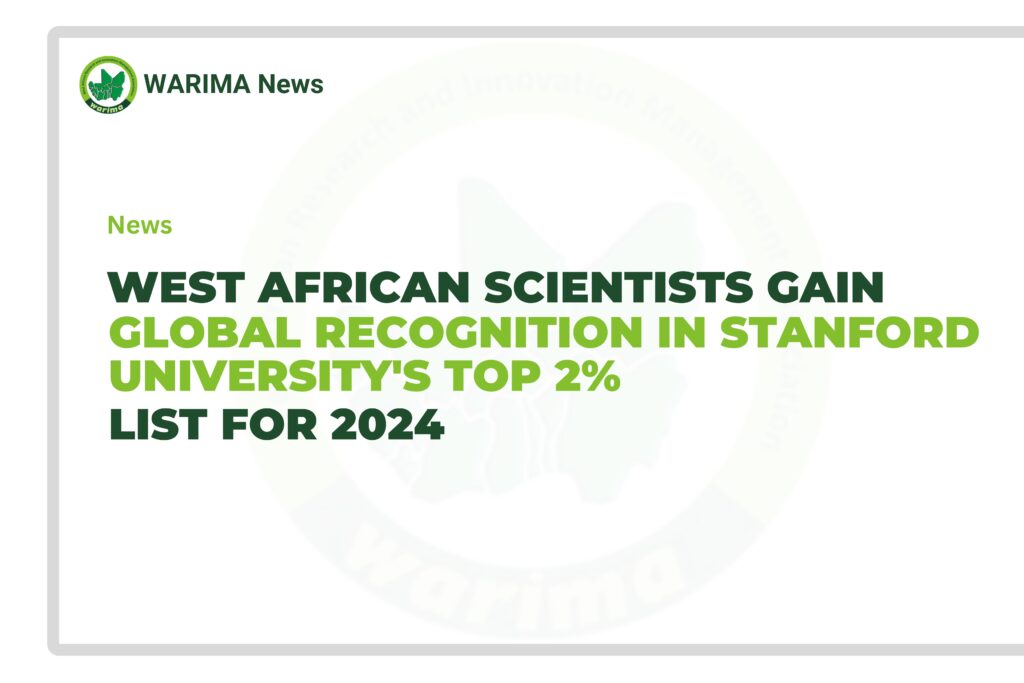West Africa has showcased its growing academic prowess, with 343 scholars from the region recognized among the world’s top 2% of scientists for 2024. This marks an impressive increase of 18.28% from last year, when 290 West African scientists were included on the list. This prestigious annual ranking, compiled by Stanford University in collaboration with Elsevier, recognizes researchers who have made significant contributions to their respective fields. The list is based on citations updated to the end of 2023. The data is collated from Scopus. The selection is based on key metrics, including citation frequency, which indicates a scholar’s influence in the global scientific community. The ranking considers both a scientist’s entire career and their impact within a single year. Metrics include the h-index, which captures both productivity and the impact of published research, and total citation counts, which measure how often a scientist’s work has been referenced by peers. To ensure fairness, the citation counts are adjusted by excluding self-citations, preventing inflated results from repeated self-referencing. Another key factor is co-authorship adjustments, which account for the degree of contribution in multi-author papers, providing a more nuanced view of individual influence within collaborative work.
Regional Breakdown
Nigeria leads the regional representation with an impressive 233 scientists included in the list. Nigerian representatives on the list are predominantly from natural and applied sciences. Other West African countries also feature prominently, showcasing the region’s rising influence in global research:
Anglophone Countries | Francophone Countries |
1. Nigeria 233 Scientists 2. Ghana: 62 Scientists 3. Liberia: 10 Scientists 4. The Gambia: 5 Scientists 5. Sierra Leone: 2 Scientists | 1. Senegal: 12 scientists 2. Burkina Faso: 8 scientists 3. Benin : 4 Scientists 4. Mali : 3 Scientists 5. Côte d’Ivoire : 2 Scientists 6. Guinea: 1 Scientist 7. Togo: 1 Scientist |
The differences in the number of scientists from Anglophone and Francophone countries on the top 2% scientist list can be attributed to several key factors. Anglophone countries like Nigeria and Ghana often have more robust research funding and infrastructure, which facilitate scientific output and collaboration. The dominance of English in scientific publishing also provides an advantage, allowing Anglophone researchers greater access to international journals and conferences, potentially leading to higher citation rates. Additionally, Anglophone researchers may benefit from more integrated international collaboration networks, enhancing their visibility and impact. Education and training opportunities in these countries are often more established, contributing to a greater number of active researchers.
Impact and Implications
This achievement underscores the growing importance of research emanating from West Africa. The inclusion of West Africa scholars showcases the region’s capacity to address global challenges through scientific innovation and research excellence. This achievement is a testament to the hard work and dedication of West African researchers. It not only puts West Africa institutions on the global map but also demonstrates their ability to contribute meaningfully to solving world problems.
Challenges and Opportunities
Despite the impressive showing, some West African countries, including Cape Verde, Guinea-Bissau, and Niger, did not have scientists included in the top 2% list. This highlights the existing disparities in research infrastructure and opportunities across the region. This emphasizes the need for continued investment in research. While we celebrate this achievement, we must also recognize the work that lies ahead. Increased funding for research and development is crucial to ensure that all countries in our region can participate in and benefit from global scientific advancements.
Looking Ahead
The recognition of these scientists is expected to inspire further investment in research and development across West Africa. As these scholars continue to push the boundaries of scientific knowledge, they are not only raising the profile of their respective institutions but also contributing to solutions for local and global issues. As West African universities and research institutions continue to grow, it is anticipated that even more scholars from the region will be recognized on the global stage in the coming years, further cementing West Africa’s position as a hub of scientific excellence and innovation.
For those interested in diving deep into the data, the official Elsevier dataset is available. You can access it at:
https://elsevier.digitalcommonsdata.com/datasets/btchxktzyw/7

